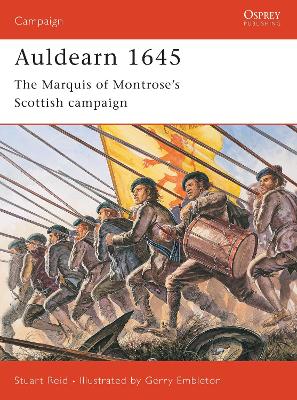Campaign
1 primary work • 4 total works
Book 142
When Charles Stuart was crowned King of Scotland, Cromwell led the English army north to counter the threat he now posed. Their march on Edinburgh was opposed by Leslie's Scottish army who used guerrilla tactics to force them back as far as Dunbar. Battle ensued on 3 September 1650, and the Scots fought with great determination until Cromwell led his cavalry against their right wing. The Scots army crumbled from right to left, and was driven from the field. Leslie retreated and Cromwell captured Edinburgh, although the war continued for another year after this crushing English victory.
Scotland in the 17th century was an independent country whose king was the King of England. Charles' proposed remodelling of the Scottish Kirk succeeded in alienating the Protestant population. In 1638 a National Covenant was signed throughout the country, opposing the King's reforms. In 1639 and 1640 two brief wars saw King Charles defeated and Scotland's independence re-asserted. However, one of the leaders, Montrose, was eclipsed by his rivals and in 1644 Montrose raised a Royalist rebellion. In the course of a year he won a string of victories that left him in momentary control of Scotland. The battle of Auldeam was the centrepiece of this campaign. This book details the remarkable Scottish campaign waged by the Marquis of Montrose.
'What a scene!' wrote Horace Walpole. 'An army in the night dragging itself up a precipice by stumps of trees to assault a town and attack an enemy strongly entrenched and double in numbers!' It was indeed a drama, as Major-General James Wolfe's army scaled the cliffs above St. Lawrence to stand with the French Canadian capital before them; and in one short sharp exchange of fire, tumble the Marquis de Montcalm's French army into bloody ruin. Sir John Fortescue famously described it as the 'most perfect volley ever fired on a battlefield', and this book explores how in just a few hectic minutes, one of the British Army's most consummate professionals decided the fate of a continent.
The first major battle in the Western theatre of the American Civil War (1861-1865), Shiloh came as a horrifying shock to both the American public and those in arms. For the first time they had some idea of the terrible price that would be paid for the preservation of the Union. On 6 April 1862 General Albert Sidney Johnston caught Grant and Sherman by surprise and very nearly drove them into the River Tennessee, but was mortally wounded in the process. Somehow Grant and Sherman hung on and the next day managed to drive back the hordes of grey-clad rebels.

